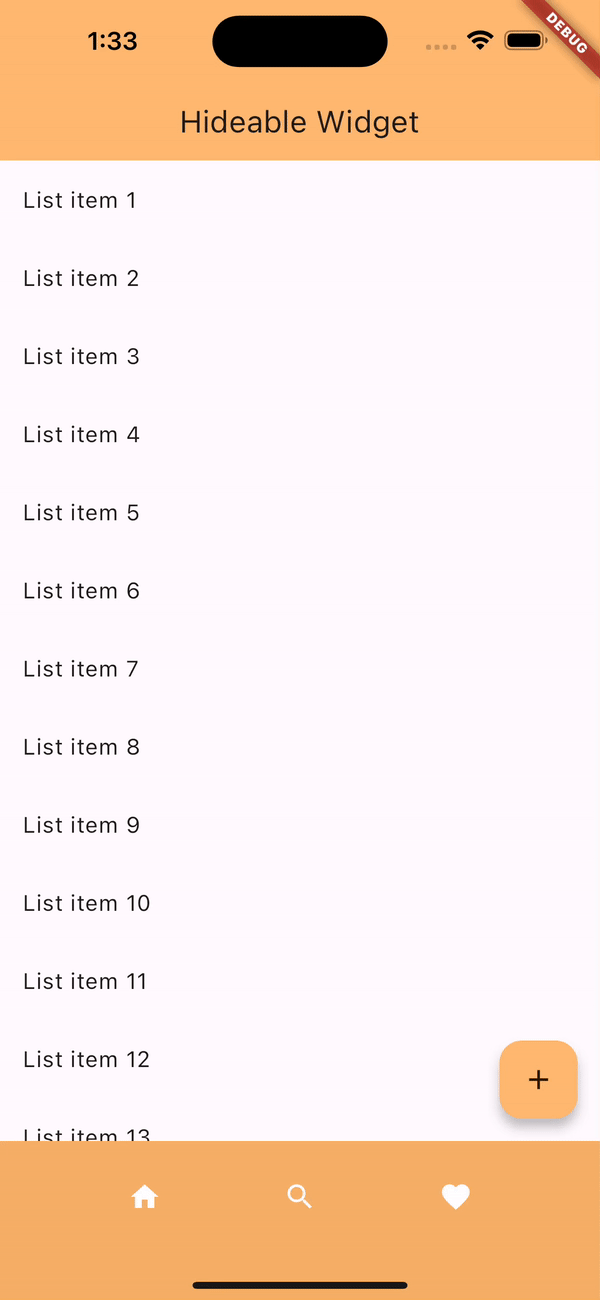Flutter可隐藏组件插件hideable_widget的使用
Flutter可隐藏组件插件hideable_widget的使用
插件简介
hideable_widget 是一个用于在Flutter中实现可隐藏组件的插件。通过这个插件,你可以轻松地将任何静态组件(如 AppBar、BottomAppBar 等)与滚动视图关联起来,并在用户滚动时自动隐藏或显示这些组件。下面是一个完整的示例demo,展示了如何使用 hideable_widget 插件。
示例效果

使用步骤
-
创建滚动控制器 首先,你需要创建一个
ScrollController,它将用于控制滚动视图的行为。final scrollController = ScrollController(); -
将滚动控制器应用到可滚动组件 接下来,将这个滚动控制器应用到你的可滚动组件(如
ListView)中。ListView( controller: scrollController, physics: const ClampingScrollPhysics(), children: [ ...List.generate( 50, (index) => ListTile( title: Text("List item ${index + 1}"), ), ).toList(), const SizedBox(height: 100), ], ), -
包裹静态组件并传递滚动控制器 然后,使用
HideableWidget包裹你想要在滚动时隐藏的静态组件(如AppBar或BottomAppBar),并将相同的滚动控制器传递给它。HideableWidget( scrollController: scrollController, child: BottomAppBar( // 你的 BottomAppBar 内容 ), ) -
完整示例代码 下面是一个完整的示例代码,展示了如何在一个页面中使用
hideable_widget插件来隐藏AppBar和BottomAppBar。import 'package:flutter/material.dart'; import 'package:hideable_widget/hideable_widget.dart'; void main() { runApp(const MyApp()); } class MyApp extends StatelessWidget { const MyApp({super.key}); @override Widget build(BuildContext context) { return MaterialApp( title: 'Hideable Widget', theme: ThemeData( colorScheme: ColorScheme.fromSeed(seedColor: Colors.orange), useMaterial3: true, ), home: const TestPage(), ); } } class TestPage extends StatefulWidget { const TestPage({super.key}); @override State<TestPage> createState() => _TestPageState(); } class _TestPageState extends State<TestPage> { final scrollController = ScrollController(); @override void dispose() { scrollController.dispose(); // 释放滚动控制器 super.dispose(); } @override Widget build(BuildContext context) { return Scaffold( appBar: PreferredSize( preferredSize: const Size(double.infinity, 56), child: HideableWidget( scrollController: scrollController, // 传递滚动控制器 child: AppBar( title: const Text("Hideable Widget"), backgroundColor: Theme.of(context).colorScheme.inversePrimary, ), ), ), floatingActionButton: FloatingActionButton( backgroundColor: Theme.of(context).colorScheme.inversePrimary, onPressed: () {}, tooltip: 'Create', child: const Icon(Icons.add), ), floatingActionButtonLocation: FloatingActionButtonLocation.endFloat, bottomNavigationBar: HideableWidget( scrollController: scrollController, // 传递滚动控制器 child: BottomAppBar( color: Theme.of(context).colorScheme.inversePrimary, child: IconTheme( data: IconThemeData(color: Theme.of(context).colorScheme.onPrimary), child: Row( mainAxisAlignment: MainAxisAlignment.spaceEvenly, children: <Widget>[ IconButton( tooltip: 'Home', icon: const Icon(Icons.home), onPressed: () {}, ), IconButton( tooltip: 'Search', icon: const Icon(Icons.search), onPressed: () {}, ), IconButton( tooltip: 'Favorite', icon: const Icon(Icons.favorite), onPressed: () {}, ), ], ), ), ), ), body: ListView( controller: scrollController, // 传递滚动控制器 physics: const ClampingScrollPhysics(), children: [ ...List.generate( 50, (index) => ListTile( title: Text("List item ${index + 1}"), ), ).toList(), const SizedBox(height: 100), ], ), ); } }
更多关于Flutter可隐藏组件插件hideable_widget的使用的实战教程也可以访问 https://www.itying.com/category-92-b0.html
更多关于Flutter可隐藏组件插件hideable_widget的使用的实战系列教程也可以访问 https://www.itying.com/category-92-b0.html
当然,以下是一个关于如何在Flutter中使用hideable_widget插件的示例代码。这个插件允许你动态地显示或隐藏组件。首先,你需要确保已经在你的pubspec.yaml文件中添加了hideable_widget依赖:
dependencies:
flutter:
sdk: flutter
hideable_widget: ^latest_version # 请替换为实际的最新版本号
然后,运行flutter pub get来安装依赖。
接下来是一个简单的示例,展示如何使用HideableWidget来动态显示或隐藏一个组件:
import 'package:flutter/material.dart';
import 'package:hideable_widget/hideable_widget.dart';
void main() {
runApp(MyApp());
}
class MyApp extends StatelessWidget {
@override
Widget build(BuildContext context) {
return MaterialApp(
title: 'Hideable Widget Demo',
theme: ThemeData(
primarySwatch: Colors.blue,
),
home: MyHomePage(),
);
}
}
class MyHomePage extends StatefulWidget {
@override
_MyHomePageState createState() => _MyHomePageState();
}
class _MyHomePageState extends State<MyHomePage> {
bool isHidden = false;
void toggleVisibility() {
setState(() {
isHidden = !isHidden;
});
}
@override
Widget build(BuildContext context) {
return Scaffold(
appBar: AppBar(
title: Text('Hideable Widget Demo'),
),
body: Center(
child: Column(
mainAxisAlignment: MainAxisAlignment.center,
children: <Widget>[
HideableWidget(
isHidden: isHidden,
child: Container(
color: Colors.red,
height: 100,
width: 100,
child: Center(child: Text('This is a hideable widget')),
),
),
SizedBox(height: 20),
ElevatedButton(
onPressed: toggleVisibility,
child: Text('Toggle Visibility'),
),
],
),
),
);
}
}
在这个示例中:
- 我们创建了一个
MyHomePage类,它是一个有状态的组件(StatefulWidget),用于管理组件的显示状态。 - 在
_MyHomePageState类中,我们定义了一个isHidden布尔变量,用于控制HideableWidget的可见性。 HideableWidget接受两个参数:isHidden(一个布尔值,用于指示是否隐藏子组件)和child(要显示或隐藏的组件)。- 我们使用
ElevatedButton来触发toggleVisibility函数,该函数会切换isHidden的值,从而动态地显示或隐藏HideableWidget的子组件。
这个示例展示了如何使用hideable_widget插件来实现一个基本的隐藏/显示功能。你可以根据需求进一步自定义和扩展这个基础示例。






